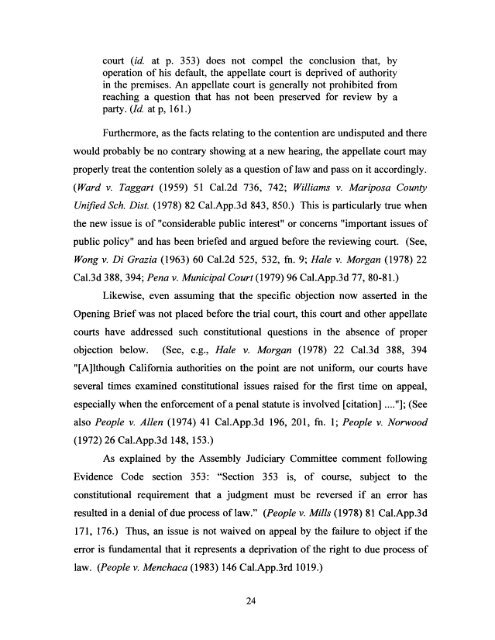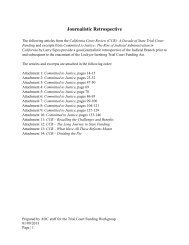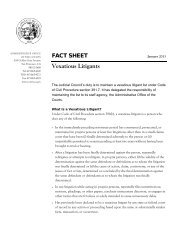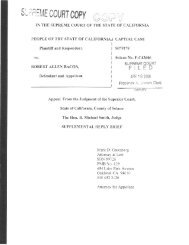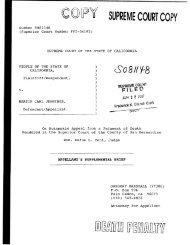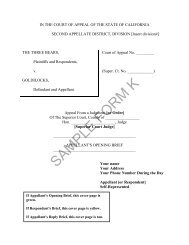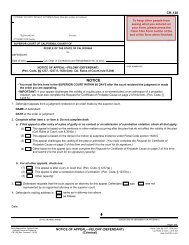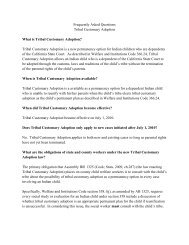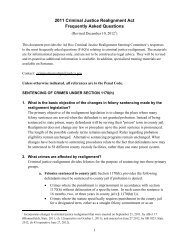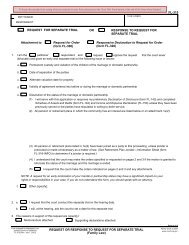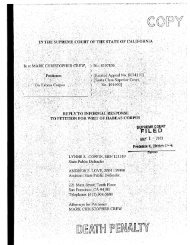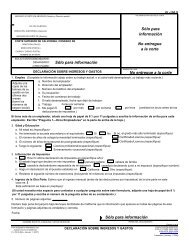Appellant, William Satele, Reply Brief - California Courts - State of ...
Appellant, William Satele, Reply Brief - California Courts - State of ...
Appellant, William Satele, Reply Brief - California Courts - State of ...
Create successful ePaper yourself
Turn your PDF publications into a flip-book with our unique Google optimized e-Paper software.
court (id. at p. 353) does not compel the conclusion that, by<br />
operation <strong>of</strong> his default, the appellate court is deprived <strong>of</strong> authority<br />
in the premises. An appellate court is generally not prohibited from<br />
reaching a question that has not been preserved for review by a<br />
party. (Id. at p, 161.)<br />
Furthermore, as the facts relating to the contention are undisputed and there<br />
would probably be no contrary showing at a new hearing, the appellate court may<br />
properly treat the contention solely as a question <strong>of</strong>law and pass on it accordingly.<br />
(Ward v. Taggart (1959) 51 Ca1.2d 736, 742; <strong>William</strong>s v. Mariposa County<br />
Unified Sch. Dist. (1978) 82 Cal.App.3d 843, 850.) This is particularly true when<br />
the new issue is <strong>of</strong> "considerable public interest" or concerns "important issues <strong>of</strong><br />
public policy" and has been briefed and argued before the reviewing court. (See,<br />
Wong v. Di Grazia (1963) 60 Ca1.2d 525, 532, fn. 9; Hale v. Morgan (1978) 22<br />
Ca1.3d 388,394; Pena v. Municipal Court (1979) 96 Cal.App.3d 77,80-81.)<br />
Likewise, even assuming that the specific objection now asserted in the<br />
Opening <strong>Brief</strong> was not placed before the trial court, this court and other appellate<br />
courts have addressed such constitutional questions in the absence <strong>of</strong> proper<br />
objection below. (See, e.g., Hale v. Morgan (1978) 22 Ca1.3d 388, 394<br />
"[A]lthough <strong>California</strong> authorities on the point are not uniform, our courts have<br />
several times examined constitutional issues raised for the first time on appeal,<br />
especially when the enforcement <strong>of</strong>a penal statute is involved [citation] ...."]; (See<br />
also People v. Allen (1974) 41 Cal.App.3d 196, 201, fn. 1; People v. Norwood<br />
(1972) 26 Cal.App.3d 148, 153.)<br />
As explained by the Assembly Judiciary Committee comment following<br />
Evidence Code section 353: "Section 353 is, <strong>of</strong> course, subject to the<br />
constitutional requirement that a judgment must be reversed if an error has<br />
resulted in a denial <strong>of</strong>due process <strong>of</strong> law." (People v. Mills (1978) 81 Cal.App.3d<br />
171, 176.) Thus, an issue is not waived on appeal by the failure to object if the<br />
error is fundamental that it represents a deprivation <strong>of</strong> the right to due process <strong>of</strong><br />
law. (People v. Menchaca (1983) 146 Cal.App.3rd 1019.)<br />
24


